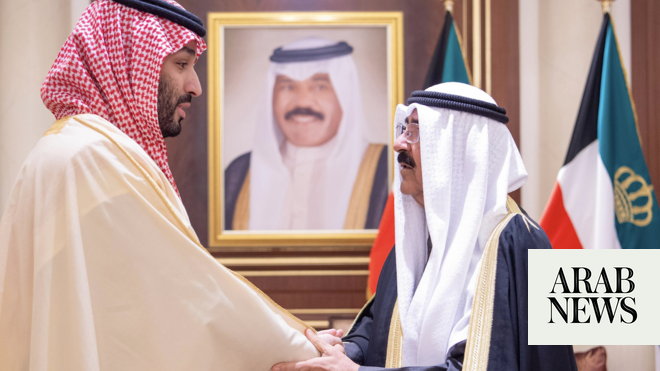DHAHRAN: Across the sandy-colored buildings and under a crisp blue sky with a slightly cool breeze, the King Fahd University of Petroleum and Minerals, or KFUPM, hosted their ninth Design Expo on Saturday.
More than 600 graduating seniors, in 131 teams, presented the prototypes and projects that they have been working on for two semesters. The expo aimed to highlight student solutions to real industry problems.
President of the university, Mohammed Al-Saggaf, stopped by each booth and listened to students explain their projects.
He emphasized that it was important to show and not just tell. The projects at the expo were an indicator of innovation and collaboration in the future and he wanted students to feel supported, seen and celebrated.
“This is the first time we made this event into an open event, we invited the families — we invited everybody who is interested,” Al-Saggaf said at the event.
“If you are a freshman, sophomore or a junior, you come here to get new ideas. If you are a family member, there is no better opportunity to support your sons — and in the future — your daughters,” he said.
In the 2021-2022 academic year, the university allowed women to enrol for the first time at the traditionally all-male campus, established in 1963.
The university also recently started allowing multidisciplinary collaboration at the expo, so students from different majors could work together in groups, mimicking standards in industry, where many would eventually be employed and expected to work in a team.
Al-Saggaf said that this new structure would help to foster collaboration among students from different fields, allowing them to benefit from each other’s knowledge and expertise. A computer science student might, for example, collaborate with a petroleum engineer to solve drilling problems using artificial intelligence, and a marketing student could help his entire team in creating an effective business model.
One participating group at the expo consisted of Mansour Arishi, Ahmed Basabrin, Dhiyaa Alkulaif and Moath Mubarky.
Their project introduced a “fruit-ripeness monitoring system, a novel approach to reducing food waste by accurately determining fruit ripeness.” They were able to do this by using a device that resembles a microwave — made of waterproof wood in case of rain — where fruit could be inserted and viewed from a clear window. At the top, in a separate section, a battery and an ethylene gas censor would help to detect the ripeness of the fruit, and in another part of the device, the result.
According to some estimates, global food waste in 2023 was 1.3 billion tons, at a loss of almost $1 trillion.
Mubarky, a mechanical engineering student, told Arab News that the project began with a familiar fruit: “We started with a banana because it is easier for everyone to see … but it can be applied to other fruits, like apples or anything else.”
When a banana or bunch of bananas is placed within the prototype they built, an alert shows the level of ethylene, a gaseous plant hormone. While it is an essential part of the plant maturity process, high concentrations of ethylene can be harmful. An unripe fruit typically has low levels of ethylene. As the fruit ripens, the percentage of ethylene increases. Rotten fruit has dangerously high levels and should be avoided.
Arishi, who is also studying mechanical engineering, said the device could be useful for farmers and shop owners — but also to the blind or visually impaired as it could be integrated with AI to alert consumers and stop them eating a fruit that might be harmful.
“We just did a small prototype but we want to improve it. We learned a lot and want to learn more. And, after graduation, we want to continue working on this … we will do this as a group,” Arishi told Arab News.
Indeed, one of the goals of the expo was to soft-launch some of these ideas and have them implemented in industry. Al-Saggaf advised students to treat every interaction during the expo as an opportunity to perfect their elevator pitch.
“Our goal this year is 5 percent of the team design projects will make it into startups — and 5 percent is not a very large goal,” Al-Saggaf said.
At the end of the event, a few groups were selected as winners in various categories — some were selected by professors, others by the audience. Each booth displayed a QR code so that people could scan it and vote.
After the awards were given out, many students returned to their booths and continued to explain their projects to audience members.
“The KFUPM Expo 2023 is a valuable opportunity to witness student creativity and excellence, reflecting their deep thought and dedication to innovating new solutions for modern industry challenges,” the university said in a statement.

